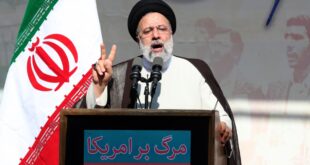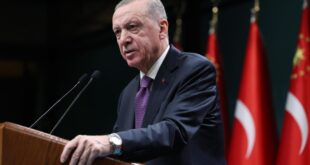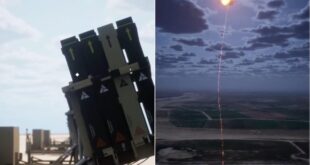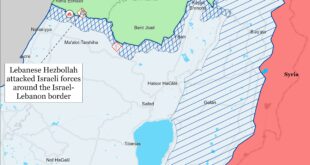A bomb killed an anti-Syrian politician Tuesday in the second such assassination in three weeks, fuelling opposition fears that Damascus and its Lebanese allies are hitting their enemies in a bid to restore their fading authority.
Former Communist Party leader George Hawi, 67, was killed by an explosion under his seat as he was being driven through west Beirut. It came as the anti-Syrian opposition was preparing to take power after winning a parliamentary majority in the staggered elections that ended Sunday.
The assassination was condemned internationally as an attack on Lebanon’s quest to break free from Syrian domination after Damascus ended a 29-year military presence in the country in April.
The United States demanded an investigation into the killing and linked the slaying to Syria’s “long and continued” influence over its neighbour.
“We strongly condemn the assassination,” White House Spokesman Scott McClellan said.
“There needs to be a full investigation into the assassination. People who are responsible must be brought to justice,” said McClellan.
“These are not random killings, these are targeted assassinations of political figures.”
“It is clearly an attempt to intimidate the people of Lebanon and to undermine progress toward a free and democratic future,” said the spokesman.
US Secretary of State Condoleezza Rice said she did not know who was responsible, but “there is a context and an atmosphere of instability” in Lebanon. “Syria’s activities are a part of that context and that atmosphere, and they need to knock it off,” she told reporters in Brussels.
The US embassy said the attack was not random: “This attack on an outspoken critic of Syria’s presence in Lebanon is once again an effort to silence Lebanese voices demanding freedom and sovereignty.”
Britain’s Foreign Office on Tuesday asked Lebanese authorities to “mount full, thorough, and transparent investigations” to bring the killers of Hawi to justice.
UN Secretary General Kofi Annan “was appalled to learn of yet another assassination in Lebanon,” UN Spokesman Fred Eckhard said. “The secretary general stands with the Lebanese today in their determination to shape a peaceful, independent and sovereign future.” In Lebanon, opposition figures quickly blamed Syrian agents and their allies in the Lebanese security services for the assassination, as they did for the June 2 slaying of anti-Syrian journalist Samir Kassir and the February 14 killing of former prime minister Rafiq Hariri.
More than 1,000 Hawi supporters gathered at the bomb site on Tuesday night, holding candles and white sheets of paper with the words: “Syria: Who’s next?” Anti-Syrian politicians have circulated reports that Syria has drawn up a hit list in Lebanon. Syria has denied such reports, and it condemned Hawi’s killing.
“This shows that the series of assassinations is continuing and the [Syrian-backed] security agencies are still at work,” said Samir Franjieh, an anti-Syrian politician.
Opposition leader Walid Jumblatt implicitly accused Lebanon’s pro-Syrian president and security agencies.
Jumblatt said the agencies must be “completely purged.” Another opposition leader, Saad Hariri, son of the slain former premier, said the bombing was “part of a series of assassinations targeting leading national personalities in Lebanon.” After a meeting of leaders Tuesday evening, the opposition called for the UN Security Council to expand the mandate of the UN team investigating Hariri’s assassination to include the killings of Kassir and Hawi.
In a statement, the opposition leaders called for “the highest possible turnout” for Hawi’s funeral on Friday, and a general strike that day.
President Emile Lahoud condemned the killing, and rejected opposition charges that he is directly responsible for the security services. He said he was blamed “seconds” after Hawi’s assassination in what seemed to be a “programmed” campaign. Lahoud is a former head of the armed forces.
Prime Minister Najib Miqati said: “We are stunned.”
Blaming “conspirators,” the prime minister said that every time Lebanon takes a step forward, something happens to try to destabilise it.
The bomb that killed Hawi was detonated by remote control like the bomb that killed Kassir in his car nearly three weeks ago, Justice Minister Khaled Kabbani said at the blast scene. Police said it was made of less than one kilogramme of plastic explosives.
The charge was placed under the front passenger seat.
After the bomb was detonated, Hawi’s car zigzagged for about 50 metres before coming to a halt in the middle of the road in the Wata Museitbeh district.
A worker at a nearby car dealership said he heard the blast and ran to the car. Hawi’s driver, slightly wounded, had gone round to the passenger door and the two men tried to lift Hawi out.
“Hawi was still alive and told the two of us, ‘Help me, help me.’ His face was bloodied, his abdomen was badly injured. Then he died,” the worker said, refusing to be named for fear of trouble with the security services.
Hawi’s stepson, Rafi Madoyan, blamed “the security system which is in power.” Speaking through tears, he warned that everybody in the opposition was a potential target.
The blast came as UN investigators questioned the pro-Syrian head of Lebanon’s Presidential Guards over the Hariri assassination. Brig. Gen. Mustafa Hamdan is one of several pro-Syrian security chiefs accused by the opposition of involvement, or at least a cover-up, in Hariri’s slaying.
UN spokesman Najib Friji said investigators “interviewed” Hamdan and searched his home and office.
“This interview does not mean he’s guilty of anything,” Friji said.
Hawi, a Greek Orthodox Christian, was once a strong Syria ally, but in recent years he frequently spoke out against Syrian intelligence and interference in Lebanese affairs.
Hawi was close to the late Palestinian leader Yasser Arafat during Lebanon’s 1975-90 civil war when his followers fought alongside Muslim and Palestinian militias against right-wing Christians and Israeli occupation forces. After the war, Hawi championed Christian-Muslim dialogue.
During its time in Lebanon, Syria filled the country’s security and intelligence agencies with its allies to enhance its control. Although Syria withdrew its troops in April, and some Lebanese security chiefs have been replaced, many pro-Syrians remain in influential positions in the security apparatus.
Hawi is survived by his wife, ophthalmologist Sossie Madoyan, and her son Rafi.
 Eurasia Press & News
Eurasia Press & News



